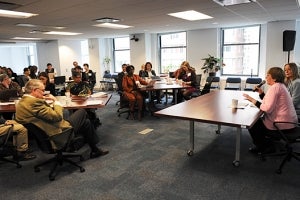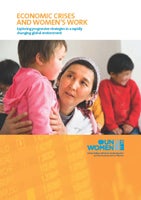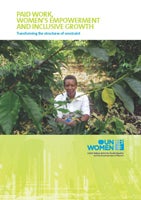Economies rebound faster from crisis when responses focus on women's needs
Date:
New York, 21 January, 2013 — Women everywhere are suffering the consequences of the current global financial and economic crises, but how Governments respond can make a big difference. Citing success stories from Sweden and Argentina, as well as from Egypt, Ghana and Bangladesh, two new research papers being launched by UN Women today point the way to how countries can ensure the policies they adopt to cope with crises can protect and empower women.
Moreover, they argue that policies which take into account the specific impact on women workers are actually more likely to result in a sustained and equitable economic recovery.
Both research papers are being launched at the two-day workshop “Critical Perspectives on Financial and Economic Crises: Why Gender Matters” being held in New York from 21-22 January 2013. Organized by UN Women and the International Association for Feminist Economics (IAFFE), the workshop will consist of presentations of this work and interventions by invited experts including policymakers.

“We know that the financial and economic crisis has worsened gender gaps in unemployment across all regions and in both developed and developing countries. In 2012, the gap widened further and women lost an estimated 13 million jobs,” noted UN Women Executive Director Michelle Bachelet, in her introductory speech.
“We need to expand our perspective by fully analysing women’s economic role in order to improve our policy responses and promote inclusive economic growth,” said Ms. Bachelet. “It is up to us to push this global debate forward to the very centers of decision-making for a real policy change.”

In “Economic crises and women’s work: Exploring progressive strategies in a rapidly changing global environment,” Professor Jayati Ghosh, Jawaharlal Nehru University, examines the economic recoveries of Sweden in the 1990s and Argentina in the 2000s, among others, and their impact on women. She concludes that strategies that protect or enhance working conditions for women can be developed as part of a broader economic policy that yields rapid economic recovery and subsequent growth.

In “Paid work, women’s empowerment and inclusive growth: transforming the structures of constraint,” Naila Kabeer, Professor at the School of Oriental and African Studies (SOAS), University of London, focuses on how economic opportunities have positively affected women in Bangladesh, Egypt and Ghana. In all three countries, formal employment and education had the greatest impact on women’s lives. The paper analyses policies that create “inclusive growth” that can advance women’s economic empowerment. It recommends creating an enabling regulatory environment, promoting social protection and supporting women’s efforts to organise themselves.
A total of seven research papers by renowned feminist academics will be presented and discussed at the workshop. They will be published in a special issue of the IAFFE journal Feminist Economics in spring 2013.